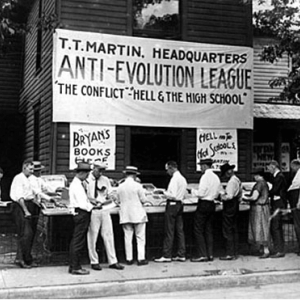This series, running between now and Election Day, examines how American evangelicalism evolved from a tradition of social reform directed toward those most vulnerable to 81 percent of white evangelicals supporting Donald Trump in the 2016 election. It’s a long, sad story of declension from the teachings of Jesus in the New Testament to an unblinking embrace of the hard-right ideology of the Republican Party.

Jimmy Carter signs extension of Equal Rights Amendment (ERA) Ratification on October 20,1978.
Because of evangelical political behavior over the last several decades, it’s tempting to believe that evangelicals have always supported right-wing causes and politicians. That is not the case, and there’s some reason to believe that in the run-up to the 2020 presidential election, we may be witnessing an awakening of conscience among some evangelicals. If so, progressive evangelicals could do far worse than look to the 1970s for inspiration.

Anti-Evolution League at the Scopes Trial. Dayton, Tenn. From Literary Digest, July 25, 1925
Symbolically, the Scopes Trial on teaching evolution was a turning point.

Pastor Tony Spell talks with journalists before attending Sunday service at the Life Tabernacle megachurch challenging state orders against assembling in large groups to prevent the spread of coronavirus disease (COVID-19) in Baton Rouge, La., April 5, 2020. REUTERS/Carlos Barria
Times of crisis tend to engender apocalyptic thinking. We’re seeing that today during the coronavirus pandemic. Conspiracy theories abound, and some people are talking about the end of the world. Could the current crisis be God’s judgment for sinfulness or our persistent abuse of the environment? Is an apocalyptic reckoning at hand?

People arrive at the Conservative Political Action Conference (CPAC) annual meeting at National Harbor in Oxon Hill, Md., Feb. 27, 2020. REUTERS/Joshua Roberts/File Photo
The emergence of Bernie Sanders as one of two finalists for the Democratic presidential nomination has renewed focus on his self-identification as a “democratic socialist.” Although several pundits, including Paul Krugman of the New York Times, have argued that Sanders’s “socialism” is really a pale version of what most Europeans regard as socialism, many Americans — including those who identify as evangelical Christians — remain suspicious of Sanders’s ideology.

Tent revival during the Second Great Awakening. "America on Stone" Lithography Collection, 1849 lithograph, Harry T. Peters. Public Domain
Last week, President Donald Trump spoke at the National Prayer Breakfast, an annual bipartisan event that brings together faith leaders and members of Congress. Using language like “I’ve been with you,” and “you better get out and vote on Nov. 3” — insinuating all those of faith gathered align with the president — Trump called once again on support from his most loyal followers: white evangelical Protestants.